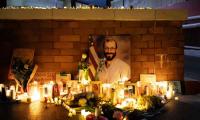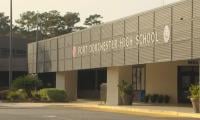Threat of legal action looms as DHA fumbles around with area’s water supply
Residents left in the lurch as DHA-CBC tussle seems set to intensify
Karachi
A little over a month ago, residents of Karachi’s upscale Defence Housing Authority (DHA) received text messages on their mobile phones relating to a new water tanker supply service for the area.
As the locality – despite its upmarket reputation and exorbitant land prices – has been in the midst of a perpetual water crisis for at least half a decade now, the message was nothing out of the ordinary for the readers. What, however, did catch their attention was the supplier mentioned in the text – DHA.
Within days, Aziz Suharwardy, vice president of the Cantonment Board Clifton (CBC) – the administrative authority responsible for the area’s maintenance and upkeep – was hosting a delegation of perturbed residents at his office.
Their complaints were centred on one aspect; how legal was it for the authority to be dabbling into commercial sale of water when it has failed to fulfil their basic right to free and clean water supply?
For Suharwardy, the issue of DHA’s financial transgressions – particularly those related to the area’s water supply mechanism – is one he has long pursued. Thus, when faced by a group of irate citizens who had come to him for his position as an elected administrative figure of the body legally tasked with water supply responsibilities, it would have been an opportune time for him to launch into a tirade against the DHA’s iniquitous actions.
However, not being particularly inclined towards needless and futile point scoring, he chose to explain to the delegation that the water being supplied was actually from a recently operational Reverse Osmosis (RO) plant; a positive fact since it implied that the plant had reached a stage of functionality.
Having highlighted the pro of the situation, Suharwardy was still scathingly critical of the DHA’s decision to sell the water to residents, asserting that the water was only meant to be supplied free of cost, and at no point had there been a plan for them having to buy it.
Assuring the residents of taking up the matter with the right people, Suharwardy, within a week’s time, met with DHA Administrator Brigadier Zubair Ahmed to discuss the area’s water shortage and the pressing measures need to alleviate the citizens’ suffering.
As per an official communiqué released by the DHA after the May 26 meeting, the DHA administrator used the opportunity to remind Suharwardy that the “…distribution and management of water fell under the purview of CBC, being a civic and municipal function, but DHA was making all out efforts to help CBC in resolving the issue...”
The carefully worded statement all but summed up the frosty state of affairs between DHA and CBC, as it managed to innocuously convey how the former – being the principal authority – has almost reserved the latter to take the fall for its failings.
DHA and CBC – a history
As noted in a research paper, ‘Land ownership, control and contestation in Karachi and implications for low-income housing’ authored by Arif Hasan and others, the DHA, formerly known as the Pakistan Defence Officers’ Cooperative Housing Society (PDOCHS), “started as a normal cooperative housing society that was registered under the 1860 Societies Act and was part of the welfare received by retired army officers.”
However, as per the PDOCHS Regulations (corrected up to June 30, 1989) available on the DHA’s official website, it was registered under Section 10 of the Co-operative Societies Act of 1925.
As the study explained, “at the end of 1970s, development was proceeding at snail’s pace and the society’s financial situation was deteriorating. In order to avert a crisis, the then military dictator of Pakistan, General Zia-ul-Haq, dissolved PDOCHS through an order and formed the DHA as an autonomous new authority with extensive development rights.”
The move that commenced in the 70s came to fruition in the 1980s with General Zia’s presidential order. The order was also the reason the CBC came into existence, as the existing Karachi Cantonment was split into two regions; the latter north of the Drigh Road railway line and the former to the south.
Evidently, the cantonments technically function under the DHA with the CBC’s official website describing its status as follows: “It [CBC] is a self-contained civic body which does not fall back for financial assistance either upon the federal or provincial government. CBC was brought into existence through a notification – SRO No. 207(1)/ (83), dated 27-2-1983 – in order to provide municipal cover to eight DHA phases, together with 13 katchi abadis located in the periphery and Blocks 8 and 9 of Clifton.”
Under the municipal cover mentioned above, also came the responsibility of water management which, according to the information provided on the board’s webpage, was first handed over to the CBC in 1984.
However, just a year later in 1985, the control of water supply was wrested away from the CBC. With the DHA having taken over the task, the authority kept it to itself for almost 24 years up until 2009, when the management responsibilities were thrust back on the CBC.
The [water] situation today
The reason the authority revisited its decision to manage water supply for over two decades, according to Suharwardy, was the failure of the DHA Cogen and Desalination Plant in 2008.
He maintains the mega $110 million project’s breakdown – just years after it was inaugurated with customary pomp and promises of being a feasible solution to the area’s water woes – led to the “worst ever shortage in the highest tax paying area of Karachi”.
To shirk the consequent negative publicity and blame, he says, the DHA, through a decree, shifted the responsibility of water supply back to the CBC.
“Along with that, they also transferred the entire burden of their employed water supply staff onto us. Now, for over seven years, all the residents and we heard were promises that the plant, once operational, would be a definitive solution for our water issue.”
Suharwardy asserts that the last thing he wants is for the water supply responsibilities to go back to the DHA, no matter the controversial circumstances and questionable intent with which the authority had relinquished control in the first place.
“We have a viable plan drawn out to, once and for all, end this area’s water problems. The solution, simply put, lies in the Reverse Osmosis (RO) technology and, if the unfair limitations we are working with were to be redressed, actual progress is guaranteed.”
The limitations Suharwardy mentions are, essentially, the direct result of the ordinance promulgated by General Zia. “This issue is rooted in the revenue sharing model that exists between the DHA and CBC till today. After Zia’s presidential order, the DHA went on to not just usurp certain municipal functions of the CBC – ones that were never legally confirmed as the authority’s domain – but has since then also been unfairly taking away a 50 percent share from the CBC’s two major revenue streams; advertisements and building control.”
“The amount that the DHA takes away from us is substantial, to say the least. For years now, I have been pushing for this unmerited revenue sharing arrangement to be done away with. If the CBC was allowed to utilise all of the revenue it legally collects, the first matter on our agenda would be installing two RO plants that could each supply one million gallons of water per day (mgd),” says the CBC VP, who secured the post after the 2015 cantonment polls held – after a gap of 18 years – on the Supreme Court’s orders.
“For me, being an elected member, the water shortage is the most pressing issue. Right now, we have to provide water to 63,000 tax-assessed units and the collective demand tallies to around 14mgd.”
“Since the DHA, being the land developer, was handling these matters, it signed agreements with the Karachi Water and Sewerage Board (KWSB) in 1999 which guaranteed an average supply of 9mgd to the area from the water board.”
“However, from July 2014 till December 2015, the CBC – which by then was again responsible for managing water supply – received just around 5.5mgd to 6mgd from the KWSB,” he explains, adding that despite the existing shortfall, the DHA has also given them additional responsibility of providing water through bowsers to the still developing Phase VIII.
“Given such challenging circumstances, we have repeatedly requested DHA to either reimburse the revenue it takes from us or to simply redirect it for the establishment of two new RO plants,” says Suharwardy, claiming that the revenue share in question amounts to approximately Rs500 million per year.
Legal recourse on the cards
“These RO plants are what is needed to alleviate the residents’ suffering, as they will definitely bring our water supply levels to a workable level. It is highly unfortunate that DHA refuses to cooperate with us in the matter, as our failure to work together is compounding the people’s misery,” says Suharwardy.
“What has made matters worse is the DHA’s recent decision to dabble into commercial sale of water from the one RO plant that has finally started functioning. It is tantamount to rubbing salt in the residents’ wounds as the people can see DHA selling water to commercial entities at highly inflated rates, while they are reduced to running pillar to post for water they have to acquire from elements within the tanker mafia.”
The situation, maintains Suharwardy, is now grimmer than ever before. “The area residents have first right to the water DHA is unlawfully selling. As they say, drastic times call for drastic measures, and we, the elected members, are fast coming to the conclusion that we will have to approach the courts for justice.”
“If the DHA fails to review its skewed policies, we will be left with no option but to move the Sindh High Court for an immediate halt to the revenue share going to the DHA,” he warns, adding that the authority should seriously look to reconsider its actions as selling water commercially simply does not befit an organisation as wealthy as the DHA.
CBC – a house divided?
Interestingly, yet plainly enough, Suharwardy and his fellow civilian elected members do not seem to have the backing of the CBC president.
As per the cantonment’s regulations, the post is currently held by Station Commander Karachi Brigadier Zahir Malik who, when approached by The News, categorically refused to acknowledge or support any move to take up the matter in court.
“They are elected representatives; they can do whatever they want. As the CBC president, I have no knowledge of any such move or plans. Even if there are any divergent opinions over a matter, we must first look to resolve it among ourselves.”
‘DHA has handed everything over’
DHA Administrator Brigadier Zubair Ahmed, too, was expectedly upfront in his assessment of the problem.
“The CBC remains the sole municipal entity that collects taxes and revenue in the form of monthly charges from housing units. Hence, principally, it is their responsibility to ensure adequate water provision for the area and its people.”
“As the master developer, we developed a plan, arranged all amenities and then handed over operational responsibilities to the CBC,” said Brigadier Ahmed, who also cited inadequate supply from KWSB as one of the chief causes of the prevalent shortage. “Our agreement with the KWSB calls for supply of 9mgd to the CBC. Till today, however, only around 4.5mgd to 5.5mgd are being supplied.”
The DHA chief also acknowledged that a RO plant had been established in Phase VIII by the authority, with assistance from a local partner, Orient, to provide water to Creek Vista, DHA-run clubs and educational institutes.
“The RO plant, currently in a pilot phase, is right now producing 0.4mgd and, after July 2016, we are expecting the output to rise to 1mgd,” he said, adding that DHA was also in ‘active negotiations’ with a company, Aqua Swiss, for a plan to establish more RO plants in the vicinity.
“If our pilot project succeeds, we will look to draw up a water-purchase agreement. It would be on a no-profit basis, under which we will request the CBC to pay us a sum only to cover the operational cost of generating the water supply.”
Since work on this report commenced around end April and authorities at DHA were duly informed, Brigadier Zubair Ahmed has conducted at least three meetings regarding the water issue, including a one-to-one with KWSB chief Misbahuddin Farid on May 16 and a follow up consultation on June 1.
The communiqué released after the latter stated that the KWSB chief had assured DHA and CBC officials that the water utility would ensure a bulk supply of 8.2mgd to their area before the start of Ramazan.
Irrespective of the reason the DHA administrator has all of a sudden been actively pursuing the water shortage matter, the developments – at least on paper – seem encouraging.
This realisation was not lost on Brigadier Ahmed either who pointed it out to The News, saying, “We feel that if our assistance can actually help the community, we should not shy away from going beyond our mandate. It was for this very reason that, on May 16, I met the KWSB chief to request him to help out the CBC by ensuring provision of at least 9mgd. Such things are not part of my portfolio, but we are willing to do whatever we can to help.”
Mere words or constructive action?
To this profession of earnest intent, Suharwardy has what may be considered a principally pragmatic reply, “We have been around long enough to know that such words, unfortunately, remain the easiest way to get someone off your back. Then again, there is always an exception to the rule; if they are willing to cooperate, we would welcome any such move.”
“That, however, in no way means that we will be backing down from the cause, and the option of legal action is one we are closely reviewing. Water and its free supply is a basic human right and, be it the DHA or the government itself, all must be held accountable.”
-
 US Opens Civil Rights Probe Into Alex Pretti Shooting: Report
US Opens Civil Rights Probe Into Alex Pretti Shooting: Report -
 Prince William, Kate Middleton Decide Next Step For Prince George
Prince William, Kate Middleton Decide Next Step For Prince George -
 Catherine O’Hara: Home Alone Actress Dies After 'brief Illness'
Catherine O’Hara: Home Alone Actress Dies After 'brief Illness' -
 Princess Anne Refuses An Offer Made At Palace
Princess Anne Refuses An Offer Made At Palace -
 'The Rookie's' Mekia Cox Reveals Her Daughter's Debut In Season 8
'The Rookie's' Mekia Cox Reveals Her Daughter's Debut In Season 8 -
 King Charles Faces Challenge Over 'disgraced' Andrew's New Home
King Charles Faces Challenge Over 'disgraced' Andrew's New Home -
 Bianca Censori 'tried' To Walk Away 'a Number Of Times' From Kanye West Marriage: Source
Bianca Censori 'tried' To Walk Away 'a Number Of Times' From Kanye West Marriage: Source -
 Halle Berry Reveals Why She Stayed 'alone' Before Meeting Boyfriend Van Hunt
Halle Berry Reveals Why She Stayed 'alone' Before Meeting Boyfriend Van Hunt -
 'A Knight Of The Seven Kingdoms' Peter Claffey Makes Rare Comment About Costar Dexter Sol Ansell
'A Knight Of The Seven Kingdoms' Peter Claffey Makes Rare Comment About Costar Dexter Sol Ansell -
 Sarah Ferguson's Friend Opens Up About Former Duchess Of York Mental Health
Sarah Ferguson's Friend Opens Up About Former Duchess Of York Mental Health -
 Claudia Oshry Shares Key Reason Behind Her Exit From 'The Masked Singer' Season 14
Claudia Oshry Shares Key Reason Behind Her Exit From 'The Masked Singer' Season 14 -
 Jelly Roll, Wife Bunnie Xo Suffer From 'baby Fever'
Jelly Roll, Wife Bunnie Xo Suffer From 'baby Fever' -
 Princess Beatrice's Husband Visits Erotic Painting In US
Princess Beatrice's Husband Visits Erotic Painting In US -
 Prince William To Turn To Zara Tindall For Support In Royal Duties
Prince William To Turn To Zara Tindall For Support In Royal Duties -
 Gabrielle Union Recalls Her First Meeting With Barack Obama
Gabrielle Union Recalls Her First Meeting With Barack Obama -
 Why Trump Nominated 'Kevin Warsh' For Fed-chair: Know All Details
Why Trump Nominated 'Kevin Warsh' For Fed-chair: Know All Details



